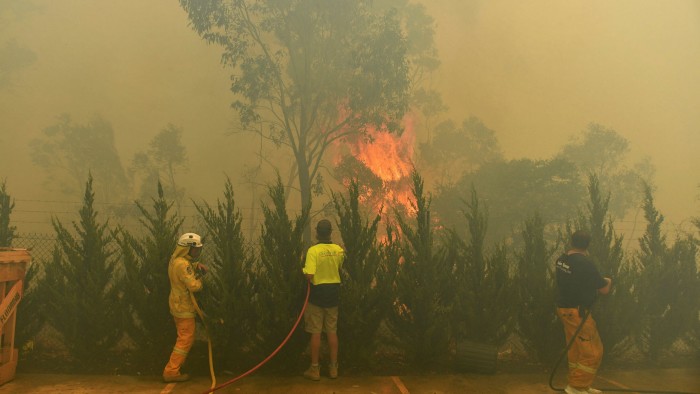We need to hit the tipping point on pricing climate risk

Roula Khalaf, Editor of the FT, selects her favourite stories in this weekly newsletter.
The writer is chief executive of Create Research
“Men take great decisions only when crisis stares them in the face.”
This insight from a founding father of European integration, Jean Monnet, sums up the capital markets’ approach to global warming.
In its annual Responsibility Report, Norges Bank Investment Management states that, based on two independent studies it had commissioned, “capital markets do not fully price climate risk”. That, coming from one of the single largest investors in the world’s stock markets, says a lot.
At this year’s World Economic Forum in Davos, business and political titans envisaged a world of unimaginable climate chaos while the global economy’s addiction to oil and other fossil fuels remains unabated.
Since then, however, the wheels of change have turned, according to Jeremy Grantham, chief investment strategist at Boston-based GMO.
“Shocking images of raging wild fires in Australia and California may be breaking the log jam, as investors are finally waking up to discover how some of their peers are shielding their portfolio,” he said at the Cayman Alternative Investment Summit last month.
He welcomed as a good omen the commitment by BlackRock to put sustainability at the heart of its investment approach. This may ratchet up progress.
Indeed, it may even accelerate it, if it changes investors’ perceptions of climate risk, according to Laurent Ramsey, joint chief executive of Geneva-based Pictet Asset Management.
“Markets have tended to view natural disasters such as floods, droughts, hurricanes and typhoons as one-off events from which affected regions may recover through a V-shaped pattern,” according to Mr Ramsey. Instead, climate risks should be viewed as a cohesive theme that may permanently weaken the capacity of the affected regions to recover; especially since the frequency and severity of natural disasters have intensified this century.
On the positive side, Mr Ramsey believes markets have already started to price the risks in sectors such as power generation, where the economics of renewable energy are constantly improving. Fresh inflows of capital are now pouring into renewables: not only are they boosting the sector’s own market valuations but also those of its commercial users by reducing their carbon footprint.
In contrast, carbon producers that are unable to migrate to green energy risk ending up with stranded assets exposed to a significant loss in value well ahead of their economic life. This much is already evident with companies involved in US oil fracking, according to Mr Grantham. Up to half of them have little free cash flow, making them highly dependent on debt that carries large credit spreads. Falling oil prices, from Russia’s recent spat with Saudi Arabia over cuts in output, could be a body blow for many of them. It is hard to see how many will survive a deep global recession.
More fundamentally, Mr Grantham questions whether, with rising efficiencies in extraction, oil majors need to explore new fields at all. Via tax breaks, the existing ones can meet global demand by extracting the reserves long trapped in previously inaccessible geological strata.
“Governments need to implement the appropriate policies to incentivise the transition,” says Gilbert Van Hassel, chief executive of Robeco, the Dutch asset manager. While welcoming what consumers and investors are doing to support green energy, he sees such efforts as necessary but not sufficient, given the sheer scale of the investment required.
Mr Van Hassel believes that a concerted global policy response is key to shifting the needle.
On climate change, international co-operation in the past has been a matter of chaotic play — coming in fits and starts — instead of a grand design. That was meant to change with the 2015 Paris agreement, which set a historic vision on global warming, with clear targets that some 200 nations had undertaken to implement. For its part, the coronavirus crisis is likely expose their internal fragilities and turn them more inward looking.
The rise of nationalism on both sides of the Atlantic has hampered progress since 2017, when the US broke ranks by withdrawing its support. The decision was damaging. As a pre-eminent superpower, the US has long been the chief architect of international collaboration in many spheres of public policy. Whether the concerted actions on climate change in Europe and China can fill the resulting vacuum is not clear as yet.
“There is no leadership in the US on the climate issue,” added Mr Grantham. But that could change after the November general election if Donald Trump loses power or the Democratic Party gains control of both houses of Congress.
In any event, until the US faces the inconvenient truth about global warming, capital markets will remain slow to react, making the final reckoning all the more painful.
Comments